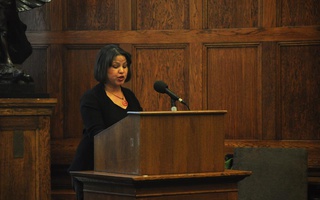Last week, the Harvard community received a rather frustrating email in response to concerns about the restructuring of the library system from University President Drew G. Faust. After Faust’s email came an equally dissatisfying email from University Provost Alan M. Garber. As someone who cares deeply about the future of both Harvard University Library and its employees, working closely with many talented librarians in Widener’s Stacks Division since 2009, these emails struck me as too little, too late.
The lack of transparency in the proposed restructuring of the library system—seemingly consisting of layoffs and an “incentivized” early retirement program affecting an undisclosed number of HUL employees—has every library employee on edge. This situation has attracted the attention of students and community members at Harvard, and even Cambridge at large. Although the Harvard community clearly would like to know more about this, the University’s best efforts seem intended to keep us in the dark. It seems as if the University prefers to sweep this dirty business under the rug, and with it the livelihoods of many of its most dedicated employees, rather than honestly answer pertinent and necessary questions about the library restructuring.
President Faust and Provost Garber's emails mainly ignore the concerns of Library staff as to the status of their jobs. Instead, the emails relate vague plans to spend a larger percentage of the library's budget on new acquisitions and upgraded technology. Some of these are great ideas, including a more centralized access policy, a more centrally coordinated collection development procedure to avoid superfluous acquisitions, and a thoughtful and redoubled digital acquisitions policy for the voyage into what Faust breathlessly terms “an exciting yet uncharted new world of digital information.” But how, logically, do these changes connote a mass reduction in staff?
Implied yet never explicitly stated is the idea that the University would only be able to afford these changes by spending radically less on staff. Instead of just out and saying that “library transition” means “pink slips,” though, President Faust slyly implies this when she says that the portion of HUL's budget allocated to the payroll is excessive: "Only 29 percent of Harvard's total library budget goes to materials, while for our peers, the average is 41 percent." But President Faust never makes clear what constitutes a peer—after all, the average holdings of the other Ivy League libraries was 7,304,694 volumes in 2009, less than half of Harvard’s 16,557,002 volumes that year, according to the Association of Research Libraries. Furthermore, most of these “peer” libraries cannot be counted among the very best research libraries in the world. Harvard is in the privileged position of holding many unique and irreplaceable collections, developed by librarians and faculty over centuries and lovingly curated today by the people who know them best. Firing these librarians to restore “balance” to the budget would be a Pyrrhic victory.
Two days following Faust’s email, the Provost of the University, Alan M. Garber, sent out his own essay on the subject. Garber’s description of the coming restructuring of the Library mentions new endeavors varying from achievable goals to hopeless pipe dreams: a “robust library portal (expected to launch this year)” which would hopefully correct the many faults of the Hollis system and could be truly beneficial, nebulous “affinity groups” joining staff between different libraries and creating a bureaucratic mess, and CVS-style self-checkout, presumably as an alternative to paying so many librarians.
Once circulation is handled by robots, who will help confused scholars locate library materials when Hollis searches turn up, as they so often do, with misleading results? Who will introduce students to resources that can not only bolster the pedigree of their papers and problem sets but also lead them to think more critically about their work and to ask questions they wouldn’t have asked otherwise?
Near the end of his long email, Garber finally mentions the repercussions of these reforms on employees of the library: “We recognize that members of the talented library staff are anxious to see how the transition will affect them as individuals, and we are confident that our new strategic direction will ultimately produce gratifying new responsibilities and career development opportunities.” This strikes me as a rather carefully worded way of saying that many of HUL’s employees will either have to work harder in increasingly understaffed libraries (the first round of cuts in 2009 having already left many divisions of Harvard’s library incredibly sparse) or will be “developing their careers” by searching for new jobs.
If HUL is, as Faust writes, “the University’s circulatory system,” the librarians are its heart. An evolving Harvard University Library that preserves its reputation of excellence is possible, but not if the University insists on continually diminishing its workforce. The administration, in choosing opacity and doublespeak over honesty and open conversation has rendered the library staff fearful for their careers and the Harvard community fearful for its librarians. These official statements are simply not enough; the librarians themselves, along with everyone who uses the libraries, deserve clarity. We deserve to know what the restructuring of the library system entails, and how that will affect those valuable members of our community who devote themselves to helping us be better scholars, performing the true function of a University.
Virginia Loperena ‘13 is a philosophy concentrator in Dudley House.
Read more in Opinion
Occupy Resurgent and RevolutionaryRecommended Articles
-
Libraries Face Possible ChangesSeven months after its creation, a task force chaired by University Provost Steven E. Hyman is poised to recommend fundamental changes to Harvard’s library system this semester, with an eye toward cutting costs and centralizing its administrative structure.
-
 From Widener to the Web
From Widener to the Web -
 Panel Discusses Future of Harvard Library System
Panel Discusses Future of Harvard Library System -
 Harvard Library Plan Under Review
Harvard Library Plan Under Review -
 Occupy Protests Outside Lamont
Occupy Protests Outside Lamont -
 Library Staff Raise Concerns at Panel Discussion
Library Staff Raise Concerns at Panel Discussion













